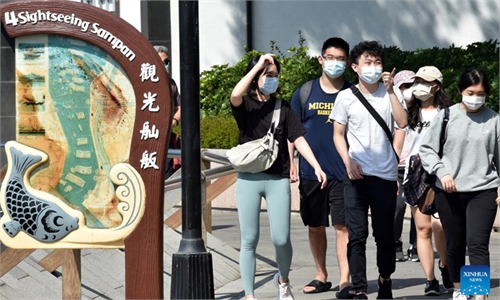
Residents queue at a mobile COVID-19 testing station in the Hong Kong Special Administrative Region (HKSAR). Photo: VCG
The first shipment of the COVID-19 oral medication Paxlovid has been distributed to the Hong Kong Hospital Authority to be used as treatment on Wednesday, while subsequent shipments are due to arrive in the next months.
Paxlovid has joined Molnupiravir, another COVID-19 oral medication, in Hong Kong's hospitals and clinics as treatment for patients. Both drugs are mainly used for adult patients with mild symptoms or those who do not require oxygen assistance, said Owen Tsang Tak-yin, medical director of the city's Infectious Disease Centre.
Leung Chi-chiu, a respiratory disease expert and former chairman of the Hong Kong Medical Association's Advisory Committee on Communicable Diseases, told the Global Times that Molnupiravir has been distributed to local clinics and hospitals for patients in need, and some are expecting the arrival of supplies of Paxlovid.
The two oral drugs are for senior patients, especially those aged 70 and above, who have not been vaccinated and have chronic underlying diseases, Leung said, noting that the introduction of the two drugs is expected to lower Hong Kong's high death rate.
Public acceptance and demand for these oral medications in Hong Kong is relatively high, Jin Dongyan, a biomedical professor at the University of Hong Kong, told the Global Times on Wednesday.
But doctors must strictly control the use of such drugs because of their high price and limited availability, Jin said, adding that a doctor will use oral medications for a patient only if it is determined that there is a high probability that the patient will develop a serious illness later in life.
Hong Kong reported 29,272 COVID-19 infections and 289 deaths on Tuesday. In the latest outbreak of COVID-19, the city has recorded a total of 962,851 infections and 4,364 deaths with a mortality rate of 0.48 percent. The death toll in Hong Kong has exceeded the deaths in Wuhan during the outbreak in early 2020.
Nearly 90 percent of the deceased were not completely vaccinated and about 87 percent had a long-term disease, Chuang Shuk-Kwan, head of the Communicable Disease Branch of the Centre for Health Protection, said at a news conference on Wednesday.
Leung mentioned that Hong Kong might need large quantities of oral drugs considering that many elderly people have not been vaccinated.
He suggested that designated hospitals and clinics should focus on treating severe cases and patients under high risk and launch an online service platform for those with mild symptoms.
Experts said that if there is sufficient supply of the oral drug in Hong Kong and doctors prescribe it to the right people, it will contribute to the decline in mortality in the city.
However, because infections caused by the Omicron variant are primarily mild, Jin said that oral drugs are not expected to become the primary treatment used in Hong Kong in the future.




